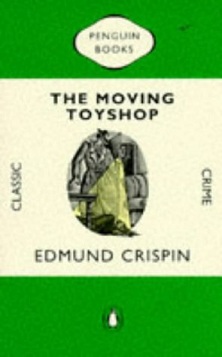
The Moving Toyshop
Edmund Crispin
205 pages
published in 1946
Edmund Crispin, the pseudonym of Robert Bruce Montgomery, who under his own name wrote music scores for amongst others, the Carry On series of movies — something I only learned when I looked him up on Wikipedia just now — was yet another of those cult favourite English detective writer. Sometimes it seems there are hundreds of such writers published from the twenties to the sixties, intermittedly forgotten and rediscovered after their deaths. In Crispin’s case he’s on the upswing, his novels having been reissued in both American and British editions in recent years. This is less of an enterprise than with some detective writers, as he only wrote nine novels and two short story collections.
My copy of The Moving Toyshop isn’t a shiny new reissue though, but a green paperback Sandra bought years ago, when she first had discovered Crispin. She was always much more of a crime reader than I am, always keen to reread old favourites, of which this was one. You can easily tell as there was a cigarette burn (and even some ash still) near the front of the book; this having been one of the books she reread a lot in hospital. I can just picture her sitting in her wheelchair, cup of crappy tea or coffee nearby, out in the hospital garden smoking a fag, reading this book and perhaps dozing off and dropping her ciggie in it….
So when I came across this book and the traces of her presence I knew I had to read it and see why she liked it so much. That was easy. It doesn’t take long to figure out that perhaps Edmund Crispin didn’t quite take his novels as seriously as some crime writers. There were several places were I snorted out loud. Crispin had an eye both for the comic phrase and the comic scene.
The Moving Toyshop stars Oxford Professor of English Language and Literatur Gervase Fen as its detective hero. Fen is the archetypical eccentric Oxford don, driving his car, the Lily Christine III with reckless abandon through the streets of prewar Oxford, keener to involve his students in his criminal investigations than in lecturing them.
It starts out however with a poet friend of his, Richard Cadogan, who comes to Oxford for a short holiday. His train going no further than Didcot, he finds himself hitching a ride into Oxford, having to walk the last few miles. Which is how he finds himself in front of a toy shop, a toy shop whose door is open. Unable to resist and reminding himself he wanted some more adventure in his life, he walks in and stumbles over the corpse of a old woman, obviously strangled. Just as he starts to realise her murderer might still be around, he’s hit from behind and loses consciousness. When he gets round, he escapes the cupboard he finds himself, leaves the shop around the back and tells his story to the police. Imagine his surprise when on returning to the scene of the crime, there’s not only no longer a body, but no longer a toy shop either…
The solving of this mystery is done deftly, the plot moves with satisfying speed and the writing as said is witty. A very nice piece of entertainment indeed. I understand why Sandra liked it so much, it’s the kind of story that’s light and fluffy enough to read almost anywhere, while still being worth rereading.